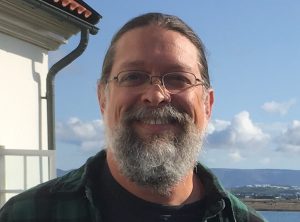
By Bianca Xu
In this series, meet members of the University of Illinois’ Research Development Community. Jason Mierek is a project manager in the National Center for Supercomputing Applications.
1. What was your path to your current role on campus?
So well, my story, my gosh, I’ve been here on the campus for 18 years and am working on my 19th year. I have an academic background in the humanities. I taught religion and philosophy at Parkland College for 10 years while also being an office manager at U of I. I’ve always been kind of good at keeping things organized. In 2014, I was hired as a project manager for Humanities Without Walls. It’s a consortium of 16 universities, humanities centers, or colleges of liberal arts.
HWW has two functions, and one of those is research development oriented — we were teaching other people how to apply for our grants and how to write budgets. In the end, I would receive about 40 reports from various principal investigators and their teams, that I would then synthesize and come up with a report to our funder on how we were spending their funds in support of all these faculty spendings. I did it for seven or almost eight years, so I have a lot of experience with research development.
In 2020, I got into the research development community. Then I left HWW and entered the world of NCSA, where my experience came in, and I became a project manager.
2. What does your day-to-day look like?
I work with the proposal development office at NCSA. Once you open the box called proposal development, you discover that inside, there’s a bunch of smaller boxes: the pre-award box, and the post-award box, and all of these different components of what we call research development. For example, the application process for a grant or fund is what we call pre-award. After you get the grant, what do you do with that? That’s what’s called post-award. I help researchers do their jobs in all these boxes. It’s managing multiple things simultaneously.
Right now, I’ve got one project with the Mayo Clinic where I primarily take notes. I am the long- and short-term memory for projects; if I had to summarize my job in one sentence, that’s it. I keep the notes, and I organize stuff. They’re publicly available, but folks rarely check the notes. So, again, I’m the collective memory for whatever projects we’re on.
3. What do you enjoy about your current position?
NCSA is a wonderful place to make connections with industrial partners like the Mayo Clinic, Caterpillar, and Syngenta. They’re working on transgenic crops, software pipelines for tumor analysis, and stuff like that.
I’m not an expert in any of these things. I’m not a coder. I’m not a cancer researcher. Instead, I’m the glue that holds all the conversations together. Like an electronics transformer, I can step down the voltage, communicate, and then back up into the other receiver. I hold things together — I’m a professional juggler. I know how to keep lots of things in the air and keep my eye on all of them at the same time.
That just comes back to taking lots of notes. And having posted notes all over the place, having whiteboards all over the place, or just having mnemonic devices to remind me of things — “Oh, yeah, don’t forget, you have to do this.”
4. What would you advise someone who is searching for job opportunities?
Remember, it is not the last job you’re going to get. I guarantee you even if you find the perfect job, the job will change like everything else in this world. It’s not perfect, and things are constantly changing. So, you’ll land on what you think is your target, and then life keeps moving, and you need a new target, which is fine.
My advice would be to recognize that the things that you think will be perfect, they probably will reveal themselves not to be, and the things that you think are horrible, oftentimes will reveal themselves to be a kind of secret presence: “Oh, wow, I’m discovering things here that I can take with me to my next job.”